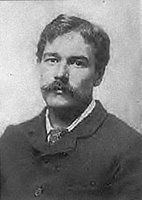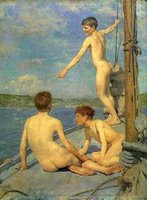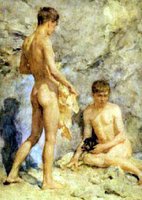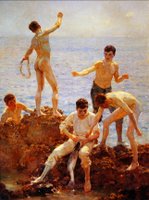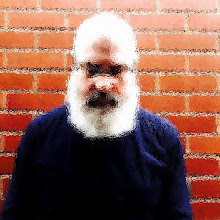 Oscar Wilde
Oscar Wilde born 16 October 1854 (d. 1900)
Oscar Fingal O'Flahertie Wills Wilde was an Irish playwright, novelist, poet, short story writer and Freemason. Known for his barbed and clever wit, he was one of the most successful playwrights of late Victorian London, and one of the greatest celebrities of his day. As the result of a famous trial, he suffered a dramatic downfall and was imprisoned after being convicted of 'gross indecency' for homosexual acts.
Though Wilde's sexual orientation has variously been considered bisexual, homosexual, and pederastic, Wilde himself felt he belonged to a culture of male love inspired by the Greek pederastic tradition. His most significant sexual relationships appear to have been (in chronological order) with (perhaps) Frank Miles, Constance Lloyd (Wilde's wife),
Robert Baldwin Ross, and
Lord Alfred Douglas. Wilde also had numerous sexual encounters with working-class male youths, who were often rent boys.

Biographers generally believe Wilde was introduced to homosexuality in 1885 (the year after his wedding) by the 17-year-old Robert Baldwin Ross. Neil McKenna's biography
The Secret Life of Oscar Wilde (2003) theorises that Wilde was aware of his homosexuality much earlier, from the moment of his first kiss with another boy at the age of 16. According to McKenna, after arriving at Oxford in 1874, Wilde tentatively explored his sexuality, discovering that he could feel passionate romantic love for 'fair, slim' choirboys, but was more sexually drawn towards swarthy young rough trade.
By the late 1870s, Wilde was already preoccupied with the philosophy of same-sex love, and had befriended a group of Uranian poets and homosexual law reformers. Wilde also met
Walt Whitman in America in 1881, writing to a friend that there was 'no doubt' about the great American poet's sexual orientation — 'I have the kiss of Walt Whitman still on my lips,' he boasted. He even lived with the society painter Frank Miles, who was a few years his senior and may have been his lover. However, writes McKenna, he was unhappy with the direction of his sexual and romantic desires, and, hoping that marriage would cure him, he married Constance Lloyd in 1884.

After meeting and falling in love with Lord Alfred Douglas, 'Bosie', in 1891, Wilde and his lover embraced an hedonistic life style, and for a few years they lived together more or less openly in a number of locations. Wilde and some within his upper-class social group also began to speak about homosexual law reform, and their commitment to 'The Cause' was formalised by the founding of a highly secretive organisation called the Order of Chaeronea, of which Wilde was a member.
Bosie's father, the Marquess of Queensberry, became increasingly enraged at his son's involvement with Wilde. He confronted the two publicly several times, and each time Wilde was able to mollify the Marquess. Eventually, the Marquess planned to interrupt the opening night of
The Importance of Being Earnest with an insulting delivery of vegetables, but somebody tipped Wilde off and he was barred from entering the theatre.
On February 18, 1895, the Marquess left a calling card at one of Wilde's clubs, the Albemarle. On the back of the card he wrote 'For Oscar Wilde posing as a Somdomite' (a misspelling of 'Sodomite').

Although Wilde's friends advised him to ignore the insult, Lord Alfred later admitted that he egged Wilde on to charge Queensberry with criminal libel. Queensberry was arrested, and in April 1895, the Crown took over the prosecution of the libel case against him. The trial lasted three days. The prosecuting counsel, Edward Clarke, was unaware that Wilde had had liaisons and romantic relationships with other males. Clarke asked Wilde directly whether there was any substance to Queensberry's accusations and Wilde denied that there was. Edward Carson, the barrister who defended Queensberry, hired investigators who were able to locate a number of youths with whom Wilde had been involved, either socially or sexually, such as the 16-year-old Walter Grainger and other newsboys and valets. Most damaging of all, among them were a number of young men who had earned money through prostitution, including one of the main witnesses, Charles Parker.
Wilde put on a tremendous display of drama in the first day of the trial, parrying Carson's cross-examination on the morals of his published works with witticisms and sarcasm, often breaking the courtroom up with laughter. However, on the second day, Carson's cross-examination was much more damaging: Wilde later admitted to perjuring himself with some of his answers. On the third day, Clarke recommended that Wilde withdraw the prosecution, and the case was dismissed. The authorities were unwilling to let matters rest.
Based on the evidence acquired by Queensberry and Carson, Wilde was arrested on April 6, 1895, at the Cadogan Hotel, London, and charged with 'committing acts of gross indecency with other male persons' under Section 11 of the 1885 Criminal Law Amendment Act. Despite pleas by friends to flee the country, Wilde chose to stay and martyr himself for his cause.

Two trials followed. The first trial ended with the jury unable to reach a verdict. The next, and last, trial was presided over by Chief Justice Sir Alfred Wills. On May 25, 1895 Wilde was convicted of gross indecency and sentenced to two years' hard labour. He was imprisoned first in Pentonville and then in Wandsworth prison in London, and finally transferred in November to Reading Prison.
Prison was harsh on Wilde's health and after he was released on May 19, 1897 he spent his last three years penniless, in self-imposed exile from society and artistic circles. After his release, he wrote the famous poem
The Ballad of Reading Gaol.
Wilde spent his last days in the Hôtel d'Alsace, now known as L'Hôtel, in Paris.
Oscar Wilde died of cerebral meningitis on November 30, 1900.
Wilde is an iconic figure in modern popular culture, both as a wit and as an archetype of gay identity. His trial, imprisonment and death have made him a gay martyr and come to symbolise the inhumane attitudes and treatment with which society has confronted gay people - although it could be argued that his foolish decision to sue the Marquess of Queensberry and his own resulting trial drove an entire generation of increasingly confident homosexual men underground and set the course of gay liberation back by untold decades - but that we shall never know.
Labels: Novelists, Order of Chaeronea, Oscar Wilde, Playwrights, Poets, Uranian Poets, Victorians, Writers
